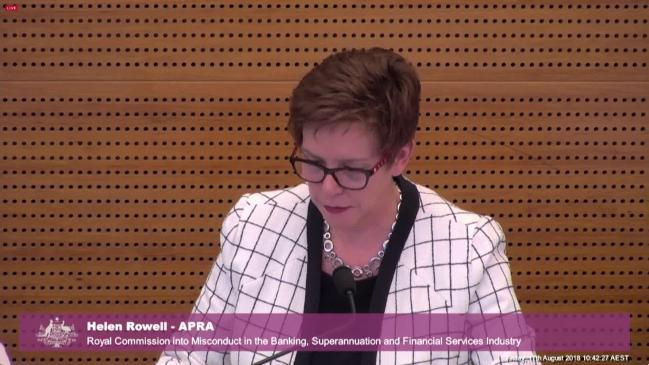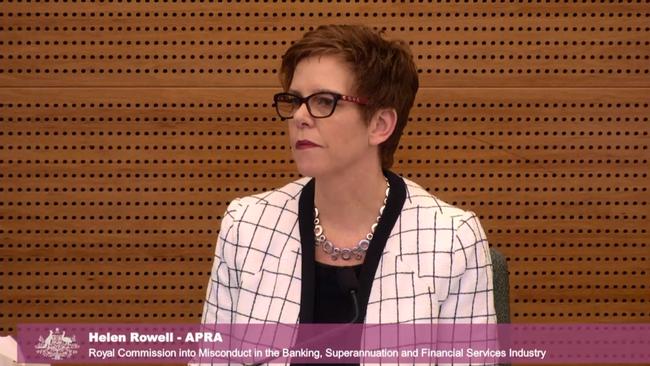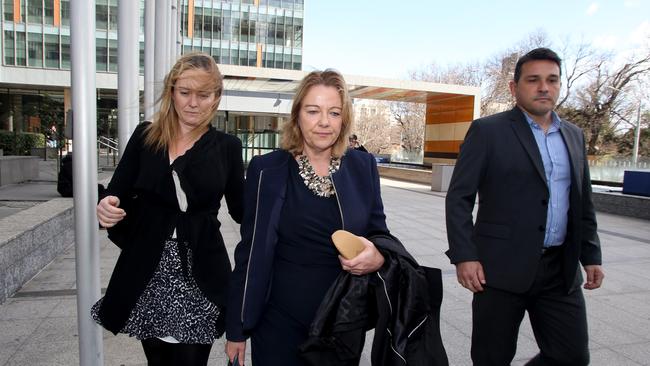Banking royal commission: APRA refuses to concede that CBA misled clients despite earlier admissions
APRA has refused to concede that Colonial First State misled super clients despite admissions by the CBA subsidiary’s head.

The prudential regulator has refused to admit that letters and calls CBA subsidiary Colonial First State made to superannuation clients were misleading, even though Colonial’s executive general manager told the financial services royal commission that they were.
In evidence to the royal commission this morning, Australian Prudential Regulation Authority deputy chairman Helen Rowell defended the regulator’s decision not to take any action against CBA for at least 15,000 criminal breaches committed by Colonial when it failed to move super savers from high-fee funds to low-fee MySuper products.
APRA continued to allow CBA to commit additional criminal offences for more than three years, the commission has heard.
Ms Rowell also defended the payment of ongoing trail commissions by super fund members, saying she could not be sure that it was not in their best interests.
Counsel assisting the commission, Michael Hodge, QC, took Ms Rowell to form letters and phone call scripts Colonial used to talk to members of the FirstChoice Personal Super fund in 2014.

Section 29WA of the Superannuation Industry Supervision Act required Colonial to move the members, who had not made any choice of how to invest their money, from the fund to MySuper by January 1, 2014, with each failure to do so a criminal offence.
However, the bank initially admitted to APRA that it failed to do so more than 13,000 times — a number that soon rose to 15,000 and then over coming years increased again as Colonial discovered hundreds of additional members it had failed to move.
In its letters and phone calls, the contents of which were approved by APRA, Colonial told the members that they needed to make an investment decision or they would risk losing their insurance and could pay higher fees, but did not explain that if they did nothing they would be moved into the low-fee MySuper product.
If members stayed in Firstchoice, they would also continue paying hefty trailing commissions to financial advisers.
In previous evidence to the commission, Colonial boss Linda Elkins has admitted the communications were misleading.
Follow the royal commission hearings via our live blog
But this morning Ms Rowell said she had not read the letters and scripts in preparation for giving evidence and dodged questions about whether the communications were misleading.
“Making misleading statements would be unacceptable,” Ms Rowell said.
“I don’t have enough information to know whether that is the case here or not.
“I think … more complete communication to the members would have been desirable.”
Mr Hodge asked her if she was aware that Ms Elkins “acknowledged that some of the statements were misleading”.
“I’m aware that’s what was indicated,” she said.
Taken to another call script, Ms Rowell said it did not “provide complete inform to the member to enable them to make their choice or decision”.
Mr Hodge: “And is that an acceptable outcome from APRA’s perspective?
Ms Rowell: “It’s not desirable.”
An incredulous Mr Hodge responded: “It’s not desirable. Surely it’s unacceptable form a regulator’s perspective?”
“It would be preferable if there was a complete disclosure to the members,” Ms Rowell said.
Asked if these were matters APRA was going to inquire into she said: “There’s no doubt that these matters are under discussion within APRA.”
Commissioner Kenneth Hayne asked her if APRA’s position was that “those discussions could not be brought to an end before you came into the witness box to give evidence”.
“That’s correct,” Ms Rowell said.
She said APRA was also aware of other, smaller breaches of the same law requiring members be moved to MySuper but had never prosecuted anybody for the crime.
The regulator decided not to prosecute Colonial because the bank agreed to a rectification program under which each breach would be dealt with within six months, either by an investment decision being given or by a move to MySuper.
“I think ultimately APRA agreed an appropriate process and was satisfied that the process had been followed,” she said.
APRA also asked Colonial to urgently move the other 60,000 members of Firstchoice Personal Super to MySuper.
But Colonial refused to do so — in part because there was “a low probability of breaching Section 29WA in the future given the controls now in place”, documents tendered to the commission show.

“But in fact it did keep breaching it,” Mr Hodge said.
“That would appear to be the case, yes,” Ms Rowell admitted.
She defended APRA’s lack of action over the crimes, even though CBA continued to commit them until at least August 2016.
“I would assume it was on the same basis, that as soon as it was identified, the members were dealt with appropriately and the process that had been agreed with Colonial to deal with those breaches had been implemented within the agreed time frames.”
She said she could tell whether members would be better off by stopping paying commissions when they moved to MySuper, where the payments are banned, because you could not look at commission “in isolation”.
“It’s hard to say, in the specifics of the case,” she said.
“You need to look at the overall structure of the arrangements.”






To join the conversation, please log in. Don't have an account? Register
Join the conversation, you are commenting as Logout